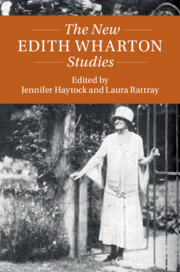Book contents
- The New Edith Wharton Studies
- Twenty-First-Century Critical Revisions
- The New Edith Wharton Studies
- Copyright page
- Contents
- Notes on Contributors
- Acknowledgments
- Editions and Abbreviations
- Introduction
- Part I Self and Composition
- Part II International Wharton
- Part III Wharton on the Margins
- Chapter 7 Edith Wharton’s Unprivileged Lives
- Chapter 8 Wharton, Insurance Culture, and Pain Management
- Chapter 9 Edith Wharton’s Humanimal Pity
- Chapter 10 Edith Wharton and the Writing of Whiteness
- Part IV Sex and Gender Revisited
- Bibliography
- Index
Chapter 10 - Edith Wharton and the Writing of Whiteness
from Part III - Wharton on the Margins
Published online by Cambridge University Press: 28 November 2019
- The New Edith Wharton Studies
- Twenty-First-Century Critical Revisions
- The New Edith Wharton Studies
- Copyright page
- Contents
- Notes on Contributors
- Acknowledgments
- Editions and Abbreviations
- Introduction
- Part I Self and Composition
- Part II International Wharton
- Part III Wharton on the Margins
- Chapter 7 Edith Wharton’s Unprivileged Lives
- Chapter 8 Wharton, Insurance Culture, and Pain Management
- Chapter 9 Edith Wharton’s Humanimal Pity
- Chapter 10 Edith Wharton and the Writing of Whiteness
- Part IV Sex and Gender Revisited
- Bibliography
- Index
Summary
For scholars thinking about the function and meaning of whiteness today, reading the works of Edith Wharton offers ways both to make visible the cultural history and influences that have led to current damaging white behaviors and to formulate strategies for rewriting whiteness. Her fiction and non-fiction delineate the behaviors and attitudes – articulated as the arbitrary codes of taste, form, and tact – of upper-class life that have trickled “down” to and have been adopted by middle-class readers and currently linger in white American consciousness as signs of the good, the right, and the normal, devaluing some non-white customs as alien and other, hiding racism within classism and perpetuating the damage of binary thinking. At the same time, Wharton’s criticism of American society and her richly allusive literary style offer ways in which today’s readers can learn to critique both her works and, more broadly, white history and culture. In particular, her late novel The Children (1928), with its attention to manners and education against the backdrop of global blackness, offers useful strategies for readers invested in re-thinking whiteness as a positive identity that values history and collectivity.
- Type
- Chapter
- Information
- The New Edith Wharton Studies , pp. 158 - 172Publisher: Cambridge University PressPrint publication year: 2019
- 1
- Cited by

